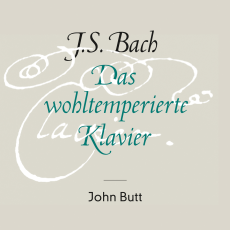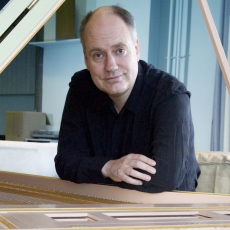John Butt - Bach WTC - The Herald Scotland
Dunedin Consort's John Butt goes solo
John Butt's new recording of Bach's Well-Tempered Clavier was never going to be run-of-the-mill.
Director of the superlative early music group Dunedin Consort, Gardiner Professor of Music at the University of Glasgow and one of the world's leading Bach scholars, Butt's approach to historical research and performance is inseparable - "elliptical" is the term he uses. Whether penning an academic tome on Bach's Dialogue with Modernity or conducting the spirited sweep of a passion or oratorio, there is brawn, wit and chutzpah behind pretty much everything he does.
The new release is his first solo recording for some time and his first ever on Linn Records. And it's good. Never for a microsecond does the playing sound 'scholarly', if 'scholarly' implies dry or lofty. This is muscular, visceral stuff - and it's precisely those qualities that demonstrate Butt's theories on the physicality of Bach's music. More on that later.
The notion of recording the 48 Preludes and Fugues had been brewing in Butt's mind for a good decade or more. The year 2000 was big for Bach - 250 years since the composer's death and an excuse for all kinds of special events and performances. The pianist Andras Schiff gave a series of recitals at London's Southbank Centre for which Butt did the pre-concert lectures. "I was chatting to Schiff about how he stays in practice," Butt recalls, "and he told me he generally plays a book of the Well-Tempered Clavier every day. So that's what I started doing. It keeps my fingers and mind in gear." Schumann once called the same routine his 'daily bread'.
If that conversation with Schiff was Butt's first incentive to make the recording, his second came when the Dunedin Consort bought its new harpsichord. The instrument is a fine copy of an early 18th century German model made by Bruce Kennedy, and with it Butt felt he could properly articulate his take on the 48. Given the character of his playing, it's not surprising that the instrument's headline quality is robustness. Forget any stereotypes of fragile harpsichord tinkling.
The third incentive was more cumulative, by-product of Dunedin's successes in recent years. "Doing all this directing with very good instrumentalists somehow made me want to be play more myself," Butt says. "I found myself thinking, 'gosh, I need to be able to be as good as the musicians I conduct or they won't listen to me!'
It's a wonderfully modest statement from someone of such academic clout who isn't exactly inactive as a performer, either. Butt has another harpsichord disc coming out on Linn next year (Bach sonatas with the violinist Lucy Russell) and when we meet for this interview he and the Dunedins are just polishing off a recording of the Bach violin concertos. He mentions various plans for organ projects, including a 'cheap and cheerful' disc of virtuoso music by Marcel Dupré and transcriptions of Bruckner's symphonies, blasted out live at Kelvingrove Museum (yes, really). Meanwhile he finds time to be a jobbing organist for Glasgow university weddings, sometimes three per Saturday. People ask for Star Wars, Beatles, Coldplay, Einaudi. One bride wanted 20 minutes of Wagner's opera Lohengrin.
But back to the Well-Tempered Clavier. For his recording Butt used recent editions by musicologists Richard Jones and Yo Tamita that represent Bach's latest known revisions - it's the first time these editions have been fully recorded. Bach's compositional process wasn't a finite thing. He tweaked constantly, never fully satisfied that he was done with a score, and the umpteen versions of any given piece make for endless musicological fun and games all these centuries later.
Perhaps more important than Butt's choice of edition are his choice of tempos. This is a recurring preoccupation and a fascinating element to all his performances. When he conducts a Bach passion or Handel oratorio, the audience gets sucked into an unstoppable momentum, one movement shifting to the next with gripping dramatic thrust. The pacing is underpinned with rock-solid reasoning but sounds as organic as the earth - rather like Bach's music itself.
Butt outlines his approach to pulse in his liner notes to the Well-Tempered Clavier. Essentially, it's by no means a fixed business: "history might inspire us to think of several dimensions simultaneously - say, pulse, notation, genre, mood, harmonic rhythm, range of note values - rather than aiming for a specific, ideal tempo. While we can never recreate the thought processes of another age, we may at least be able to share in some of the ways in which performers might have combined ideas and parameters." These sentences give a fair insight into his take on historical performance as a whole.
When it comes to how slow or fast to play each prelude or fugue, then, Butt's choices are fastidiously argued but his bottom-line is feel. He's happy to use words like 'mood' and 'emotional power'. He points out that without metronome markings at the start of each piece, the closest standard we have is human pulse - a tempo ordinario. (Even this has changed over the intervening centuries; today we're bigger, more sedentary and generally stodgier than we were in the 1700s and our average pulse is slower.)
And so to the point about the wonderfully visceral quality of the recording, and why that is the thrust of Butt's musicological argument. One of his current lines of research is how baroque music relates to dance - "an inroad," he says, "for us to understand how Bach viewed the physical. So often we think of Bach as a mind composer, but his music is very physical. Dance was a crucial form of regulation in the early Enlightenment; it acknowledged that people had physical emotions that, if left unchecked, could lead to total disorder. Dance became a way not just of regulating hierarchy but of regulating one's own body." There's a huge amount more to unpack on this subject. Suffice it to say, even among the densest fugal passage Butt drums out the earthy rhythms of a proper knees-up.
Ultimately he frames his tempo choices with the Enlightenment mathematician-philosopher Gottfried Leibniz, whose theory of a unified world encompassed strictly calculable yet wildly diverse elements - Butt short-hands it as a 'one-world' view. "A world with its own immense variety and regularities and one in which the human seems meant to feel 'at home', since both the variety and the regularity have analogies with our own bodies and their functioning." Dance is in there, yes, but he's also getting at an intriguing political point. "Perhaps there are great advantages in being reminded of the one-world view in our own multi-world state," Butt writes. As so often with a rich piece of research or performance, this new recording provokes as many new questions as it resolves.

